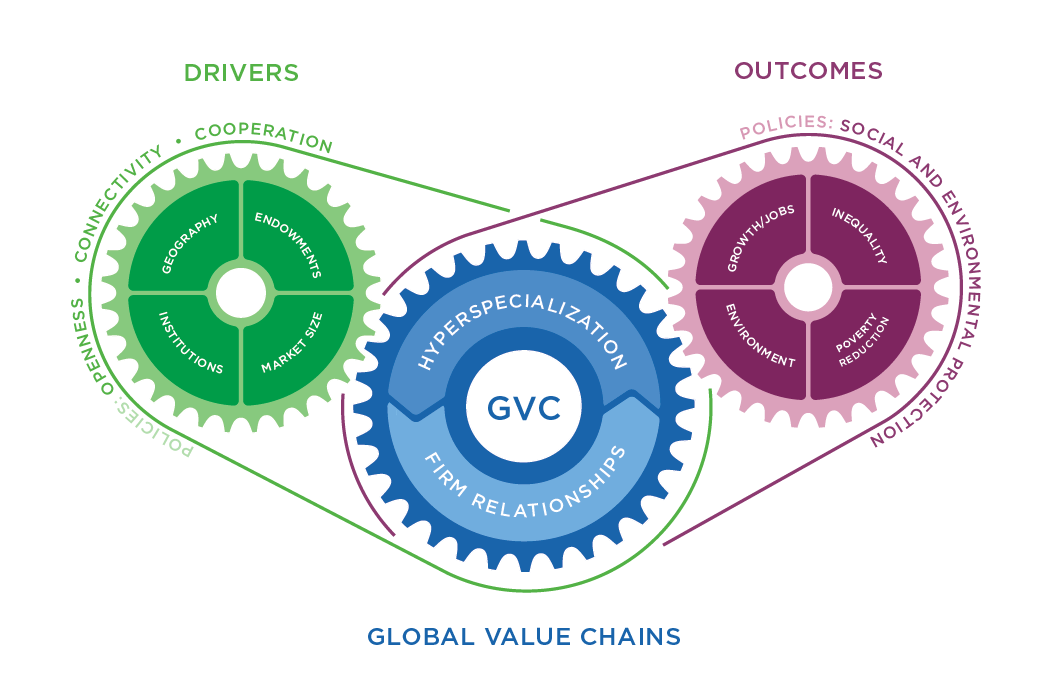
Following an intense research and writing process over the last 10 months, I am pleased to announce that a draft of the World Development Report (WDR) 2020 – Trading for Developing in the Age of Global Value Chains is now available online for public comment.
Why Global Value Chains (GVCs) and why now?
The World Bank’s last report on trade was more than thirty years ago – WDR 1987 Industrialization and Foreign Trade. In the meantime:
- Trade’s share of GDP globally has doubled;
- Average income grew by 24 percent globally;
- Poverty declined from 35 percent to 10 percent;
- The income of the bottom 40 percent of the world population increased by close to 50 percent.
Through all this, global value chains has emerged as the dominant mode of doing international business.
While several GVC reports have been written, the 2020 WDR marks a milestone in the following respects:
- The report approaches the topic from a development perspective, whereas much of the literature to date focuses on advanced countries and a few large developing countries.
- The report showcases and advocates the need for new types of data and analysis on the determinants of GVC participation and the consequences for economic growth, inequality, poverty, employment, and the environment.
- The report also looks ahead at how new technologies and changing trade policies may affect the prospects for development through GVCs.
Tackling the big issues
How important are GVCs for development? We approached this topic with an open and objective mind, determined to discuss both the pros and cons of GVC-led economic growth and development.
I was myself surprised by the extent to which GVCs made a difference. We found that GVC trade in the past 30 years has accelerated economic growth and reduced poverty greatly. It has enabled an unprecedented convergence: poor countries grew faster and began to catch up with richer countries. Productivity and incomes rose in countries that became integral to global value chains—China, Vietnam, and Bangladesh, among others. And the steepest declines in poverty occurred in precisely those countries.
One of the most exciting findings is that all empirical evidence – from cross-country, to sector, to firm-level – supports a picture of GVCs greatly boosting productivity and incomes. In contrast to “standard” trade carried out in anonymous markets, GVCs typically involve long-term firm-to-firm relationships. This “relational” nature of GVCs makes them a particularly powerful engine for growth, as they represent a natural vehicle for technology transfer. Firms have a shared interest in specializing in specific tasks, exchanging technology and learning from each other. This is most easily done in the context of longer-term firm-to-firm relationships.
But not all our findings are positive. There is strong evidence that the gains from GVC trade are being distributed unequally within and across countries. This evidence has improved our understanding of why some workers, firms, and communities have been hurt by globalization as well as where environmental risks have arisen. It has helped us reflect on strategies that promote GVC participation as well as policies that ensure a fair distribution of benefits across society and containment of potential environmental costs amidst a future of rapid technological change and policy uncertainty.
The draft concludes that GVCs can continue to boost growth, create better jobs and reduce poverty, provided developing countries implement deeper reforms and industrialized countries pursue open, inclusive, and predictable policies. Importantly, if countries fail to invest in human capital, they may end up in a middle-income trap and miss out on the next stage of development. The evidence also indicates that technological change is likely to be more a boon than a curse for trade and GVCs. The benefits of GVC participation can be widely shared and sustainable if all countries enhance social and environmental protection.
We want to hear from you
I am sure you have many questions, and I hope we manage to answer most of them.
I encourage you to review the draft to learn more about our analysis and findings, and to provide feedback based on your own experience. Please do share your views in the comments section below or via email, preferably by the end of July. The team will continue to work on the draft through the summer and we welcome all input. The final Report will be published in October.


Join the Conversation